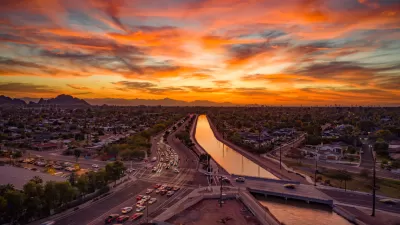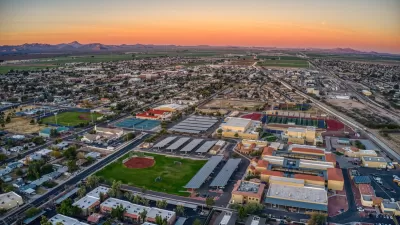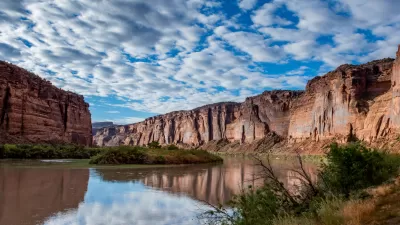Due in part to the state’s history of ‘wildcat’ real estate developments, some communities are losing access to water sources as cities and water agencies look for ways to conserve shrinking water supplies.

Expanding on the saga of the Rio Verde Foothills, an unincorporated Arizona community that recently found itself cut off from water supplies from nearby Scottsdale as part of that city’s efforts to conserve water, Sarah Tory describes the situation in High Country News, speaking with Susanna Eden, assistant director of the University of Arizona Water Resources Research Center.
Now, the 25 to 35 percent of residents who have relied on water trucked in from Scottsdale have to find new, more distant, more expensive water sources. According to Eden, this is “a textbook case on the perils of Arizona’s “wildcat” housing developments, which sidestep the state’s groundwater laws to construct homes without a fixed water supply, as well as the far-reaching implications of the worsening drought on the Colorado River.”
Rio Verde Foothills residents, Eden says, “have options they’re choosing not to pursue. They could develop a water cooperative, which would tax or levy a fee on all the members to set up a water supply service. It would mean getting permission to drill wells and building out a distribution system. Or they could negotiate with private water companies to serve the area.”
Eden suggests that reimagining growth in the desert southwest means combining a range of approaches. “That is, keep looking for more, keep using less, and keep finding ways to squeeze value out of the amount of water we have now and can use.”
FULL STORY: What happens when an affluent Arizona suburb’s main water supply is cut off?

Planetizen Federal Action Tracker
A weekly monitor of how Trump’s orders and actions are impacting planners and planning in America.

Chicago’s Ghost Rails
Just beneath the surface of the modern city lie the remnants of its expansive early 20th-century streetcar system.

San Antonio and Austin are Fusing Into one Massive Megaregion
The region spanning the two central Texas cities is growing fast, posing challenges for local infrastructure and water supplies.

Since Zion's Shuttles Went Electric “The Smog is Gone”
Visitors to Zion National Park can enjoy the canyon via the nation’s first fully electric park shuttle system.

Trump Distributing DOT Safety Funds at 1/10 Rate of Biden
Funds for Safe Streets and other transportation safety and equity programs are being held up by administrative reviews and conflicts with the Trump administration’s priorities.

German Cities Subsidize Taxis for Women Amid Wave of Violence
Free or low-cost taxi rides can help women navigate cities more safely, but critics say the programs don't address the root causes of violence against women.
Urban Design for Planners 1: Software Tools
This six-course series explores essential urban design concepts using open source software and equips planners with the tools they need to participate fully in the urban design process.
Planning for Universal Design
Learn the tools for implementing Universal Design in planning regulations.
planning NEXT
Appalachian Highlands Housing Partners
Mpact (founded as Rail~Volution)
City of Camden Redevelopment Agency
City of Astoria
City of Portland
City of Laramie





























